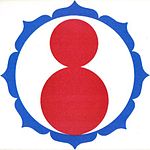- Jidokwan
-

Taekwondo Jidokwan Founder Sang Sup Chun Current head Sung Wan Lee Ancestor arts Kong Soo Do, Kwon Bop Boo[1] Official Site Taekwondo Jidokwan Jidokwan Hangul 지도관 Hanja 智道館 Revised Romanization Ji Do Gwan McCune–Reischauer Chi Do Kwan Jidokwan is one of the original nine schools of the modern Korean martial arts that became Taekwondo and was founded in what is now South Korea at the end of World War II. Its name translates as "School of Wisdom". The Jidokwan in Korea still exists today. It functions as a social fraternal order. Jidokwan supports and endorses the Kukkiwon method of Taekwondo, and supports the WTF.
Contents
History
The foundations of what was to eventually become Jidokwan were laid down by Chun, Sang Sup.
When he was seventeen years old, Chun relocated to Japan to attend College at Dong Yang Chuck Sik (Takushoku) University in Japan, where he mastered Shotokan Karate under Gichin Funakoshi. Upon his return to his native Korea, he began teaching the Karate that he had learned in Japan at the Chosun Yun Moo Kwan school of Judo. This was one of the few martial art schools that the Japanese occupying forces allowed to exist during this period of military occupation. During this time, he had a very close relationship with Byung In Yoon, who studied Chuan-fa in Manchuria and became a Shudokan Karate "Shihan" (Sabum or teacher) under Kanken Tōyama while he studied in Japan.
Chun and Yoon would travel to train with other martial artists, sometimes traveling to Manchuria. They trained with each other so much that they became known as brothers. Yoon taught class at Chun's Choson Yun Moo Kwan Kong Soo Do Bu for about 6 months before opening his own club called the YMCA Kwon Bop Bu. Yoon's YMCA club later became the Chang Moo Kwan, which he founded with his most senior student, Nam Suk Lee.
During the Korean War, all schools of martial arts were closed in Korea. This was also the case with the Chosun Yun Moo Kwan. Sang Sup Chun and Byung In Yoon both vanished during the Korean War. Sang Sup Chun has never been heard from since the Korean War. Byung In Yoon died of lung cancer on April 3, 1983 in Cheong-jin City, Ham-Gyoung North Province.
The Jidokwan still exist in Korea today and functions only as a fraternal order which endorses the Kukkiwon system and supports the World Taekwondo Federation.
Philosophy
Taekwondo Jidokwan's philosophy is as follows (as published in the 2006 Jidokwan 60th Anniversary Handbook):
Leadership (Jidoja)
1. A leadership imbued with wisdom and refinement.
2. A courageous activist who thinks before his action.
3. A patriot who is devoted to the welfare of his/her nation.
The objectives of Instructor Education1. To help maintain self-perfection which is respected by the public.
2. To help form an avant-garde in organizing national force to stop the aggressors.
3. To help achieve ideological innovation in taekwondo spirit.
4. To help actively participate in the service to the public for the community development.
5. To help foster high hopes and great ambition by encouraging savings.
The Spirit of the Eight Manners of Solemnity
1. View Rightly
2. Feel Rightly
3. Think Rightly
4. Speak Rightly
5. Order Rightly
6. Contribute Rightly
7. Use Abilities
8. Conduct Rightly
Credo of Taekwondo Jidokwan
1. Taekwondo for myself.
2. Taekwondo for the Jidokwan.
3. Taekwondo for our country.
Jidokwan Pledge
1. I will observe the rules and absolutely obey the order of Jidokwan.
2. I will attain physical and mental discipline in the spirit of Jidokwan.
3. I will devote myself to the creation of new tradition and achievement of Jidokwan.
References
- World Taekwondo Magazine, August 1997 (Korean) Publisher LEE, Kun Chul.
- A Modern History of Taekwondo 1999 (Korean) Kyong Myung Lee and Kang Won Sik ISBN 89-358-0124-0
- Global Taekwondo 2003 (English) Kyo Yoon Lee ISBN 89-952721-4-7
- A Guide to Taekwondo 1996 (English) Kyo Yoon Lee ISBN 8975000648
- Kukkiwon 25th Anniversary Text 1997 (Korean) Un Yong Kim
- Jidokwan Annual Year Book 1989 (Korean) Chong Woo Lee
- Taekwondo Jidokwan Society, The Evolution of Jidokwan 2008 (Korean/Italian/English) Al Cole
- Kim, Soo and Robert McLain. “Yoon Byung-in Story.” 2006. Kim Soo Karate, Inc. May 3, 2006 http://www.kimsookarate.com/intro/yoon/Byung_In_YoonrevMay3.pdf
External links
- Taekwondo Jidokwan Society
- Taekwondo Jidokwan, Korea Includes an interview with Grandmaster Lee Chong Woo from the Korean language magazine "World Taekwondo", August 1997
- Official Taekwondo Hall of Fame was founded by Jidokwan GM Gerard Robbins
Categories:- Taekwondo kwans
Wikimedia Foundation. 2010.
